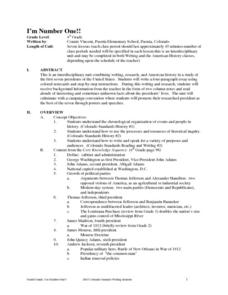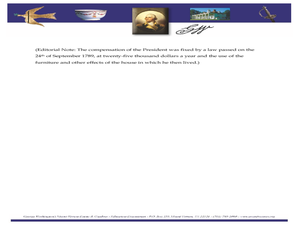National Endowment for the Humanities
Lesson 4 James Madison: Internal Improvements Balancing Act—Federal/State and Executive/Legislative
Who has the power? The founding fathers asked the same question when the United States was formed. Learners explore issues that arose during Madison’s presidency that raised constitutional questions. Through discovery, discussion, and...
Curated OER
Understanding James Madison The Father of the Constitution
Students research James Madison and create a table of his strengths and weaknesses. In this James Madison instructional activity, students read Jean Fritz's, The Great Little Madison, while developing their research skills, vocabulary...
Curated OER
James Madison: From Father of the Constitution to President
Students investigate reasons why James Madison is called the "Father of the Constitution." They discuss three events during his presidency that raised constitutional questions and look at Madison's opinions of those questions. They...
Curated OER
The Federalist Defense of Diversity: Extending the Sphere
How did early Americans ensure expansion while also securing the rights of citizens? Alexander Hamilton and James Madison, two of our early leaders, considered the problem of faction to be the "mortal disease" that created unstable...
Curated OER
President Madison's 1812 War Message: A Brief Overview
High schoolers investigate President Madison's War Message. Students read the message and discuss any information they may have misunderstood. High schoolers hypothesize about what kinds of documents might help them find answers to their...
Curated OER
President Madison's 1812 War Message: Answers Lead to More Questions
Students investigate President Madison's case for declaring war against Great Britain. Students assume the roles of newspaper reporters and cite key points in Madison's argument for declaring war, and hypothesize about primary documents...
James Madison Memorial Fellowship Foundation
A Deliberate, Palpable and Dangerous Exercise of Other Powers: James Madison & Homeland Security
This resource uses primary source documents to explore the First Amendment. After reviewing key events of the 1790s, government or US history classes explore Madison's letter to Jefferson regarding the Alien and Sedition Acts. They then...
National Endowment for the Humanities
Chief Executives Compared: The Federalist Papers
Delve into the responsibilities of the president by looking at President Hamilton's opinion of the presidential office in his own words. The second in a three-part series, the resource also offers an interesting compare-and-contrast...
Curated OER
President Madison's 1812 War Message: A Documentary Review
Students analyze primary documents to determine why President Madison believed it was important for the US to declare war with Great Britain. Students research documents on the Internet to determine President Madison's argument for going...
Curated OER
Marbury v. Madison (1803)
Students examine federalism and judicial review. In this Supreme Court lesson, students examine primary documents from Marbury v. Madison and discuss the implications of the decision.
Curated OER
Get to Know Your Bill of Rights
Sixth graders research and examine the first ten amendments to the Constitution of the United States of America. They sequence events significant to this time period, read and discuss text, and in small groups prepare and present the...
Curated OER
I'm Number One!
Fourth graders complete a unit of lessons on the first seven presidents of the U.S. They conduct research, write a four-paragraph essay, and create posters and speeches for a simulated campaign convention.
Curated OER
TURNING POINT IN HISTORY:The War of 1812
Young scholars act as investigative reporters and research battles or events of the War of 1812. They write an original article, which may include a map, drawing, or illustration.
Curated OER
How the Court Became Supreme
Students investigate how the Supreme Court changed under the leadership of John Marshall. In this Supreme Court activity, students recognize the role of the Supreme Court as well as the significance of Marbury v. Madison. Students also...
National Constitution Center
Writing Rights: The Bill of Rights
Where did the cherished ideals enshrined in the Bill of Rights originate? While history gives the Founding Fathers much of the credit, laws in colonial America influenced the Bill of Rights. An interactive web-based activity allows...
Curated OER
Interview With the Signers of the Constitution
Students work in small groups to develop three questions that a newspaper reporter assigned to cover the signing of the Constitution might have asked each of the following signers of the Constitution: George Washington, Benjamin...
Curated OER
Roots of Religious Liberty
Students examine the First Amendment and consider the contributions of James Madison and Thomas Jefferson. They review conflicts between the rights of Church and State and write a Madisonian argument on the issue.
Curated OER
African American Education in Virginia During the Jim Crow Era
Students read and analyze a letter writtine by Dolley Madison. They evaluate a cartoon. They evaluate portraits of Dolley and James Madison. They create an earlier version of the original letter based on the information they have gathered.
K12 Reader
The Greatest President
Who is the greatest US president? George Washington? Abraham Lincoln? FDR? Find out the opinions of your young historians with this cross-curricular writing prompt that engages them in researching the accomplishments of these influential...
K20 LEARN
Analyzing Early American Figures: Analyzing History
Who were they? High school freshmen brush up on their research skills by investigating an important person in American history. They select a name, fill out a KWHL chart, and research why their person is important. Scholars then complete...
Curated OER
Establishing the Presidency
Young scholars consider how George Washington influenced the presidency. In this presidential history worksheet, students discuss the precedents Washington set and analyze a letter that Washington sent to James Madison.
Judicial Learning Center
The Power of Judicial Review
Marbury v. Madison is arguably the most important landmark case in the history of the Supreme Court. A fact-filled lesson provides background information about the case and two others related to the concept of judicial review. Scholars...
Curated OER
The Monroe Doctrine: U.S. Foreign Affairs (circa 1782-1823) and James Monroe
High schoolers read the test of the Monroe Doctrine then list the key points and discuss its central tenets.
Curated OER
Lesson Two: The Federalist Papers
Students identify Articles of Confederation and explain why it failed, explain argument over need for Bill of Rights in Constitution and James Madison's role in securing it's adoption, and compare and contrast ideas of Federalists and...
Other popular searches
- James Madison Bio Poem
- James Madison Federalist 10
- James Madison Presidency
- James Madison President
- James Madison as President
- James Madison Biopoem
- James Madison for Children
- James Madison Presidencey
- James Madison Constiution
- James Madison Constitution

























